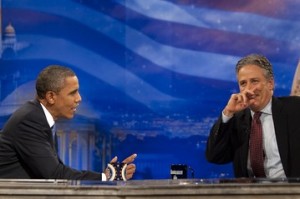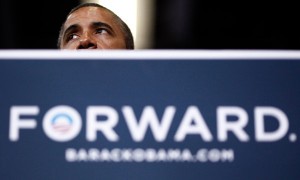 In the aftermath of the Cordoba mosque controversy back in 2010, comedian Jon Stewart famously poked fun at the President, claiming that Barack Obama’s slogan was going to be amended to read “yes we can…but should we?”
In the aftermath of the Cordoba mosque controversy back in 2010, comedian Jon Stewart famously poked fun at the President, claiming that Barack Obama’s slogan was going to be amended to read “yes we can…but should we?”
While Stewart, himself a supporter of the President, certainly didn’t mean it in any way other than comedic, this quote may perfectly encapsulate the essence of modern liberalism. That’s because the essence of modern liberalism is relativism, and everything, except for any adherence to absolutes, is permissible in the ideology of progressivism. Thus, liberalism is progressivism, and progressivism is marked by moral relativism. But it hasn’t always been this way and, in fact, this breakdown of liberal coherency came over a century, not overnight.
Our friends at the Heritage Foundation have rightly pointed out that modern liberalism came in three distinct waves. These successive waves, each of which dramatically altered the American landscape, came in over a nearly 100 year period, each building upon the other. The reason the word “progressive” is applied to liberal politics is that, in their ideological worldview, the casting off of restraints, moral and otherwise, allows the human race to “progress” toward its inherent perfection.
Thus, at the heart of modern liberalism is the belief in the perfectibility of man, and a denial of our moral fallibility.
The foundation of modern liberalism was laid with the first “wave,” which Heritage calls “political liberalism.” The chief proponent of this philosophy was President Woodrow Wilson, who fully rejected the notion of timeless truths that transcend the ages. As Woodrow Wilson believed that each successive generation had to find its own “truths,” he rejected the idea that the American Constitution, written in the 18th century, could have any impact on Americans in modern times.
The heart of Woodrow Wilson’s political liberalism was this firm belief that our Founding Fathers’ values, principles and understanding of truth did not apply to future generations of Americans. Thus, political liberalism rejected natural rights and natural law as the basis for human freedom, and set the stage for government, not God, to become the source of human rights and liberties. This philosophical foundation opened the door for the second wave of liberalism, which the Heritage Foundation labels as “economic liberalism.” The chief proponent of this second wave of the liberal-progressive juggernaut was none other than Franklin D. Roosevelt. Roosevelt built on the beliefs espoused by Woodrow Wilson that absolute truth absolutely doesn’t exist, and that rights aren’t based on natural law. Instead, Roosevelt believed that government should “grant” rights to the people, and define what it means to be free. Thus, Roosevelt pushed for his New Deal economic reforms, which were collectivist economic policies that gave enormous power to the government, while undermining the individual. The New Deal was passed off as a “Second Bill of Rights,” and as the modern manifestation of the American creed, though now rights were believed to come from the collective (from the government) not from God.
Both of these first two waves of liberalism paved the way for the third and, arguably, the most dangerous: cultural liberalism. Cultural liberalism merely took the breakdown of belief in absolutes in the political and economic arena, and took it to its logical conclusion. This conclusion is that, absent any belief in absolute truth, even cultural concepts and accepted norms aren’t truly binding. Thus, the moral relativism of the 1960’s came crashing down on American culture, and ushered in a new era of uncertainty and identity confusion in our country.
This utter breakdown of belief in anything sacred, absolute and true has left our nation adrift. Consequently, it has also paved the way for the complete unraveling of secular-liberalism, in that such a philosophy of relativism will, eventually, self-destruct. Any political system that claims to usher in order absent any absolute principles is hopelessly confused and doomed to fail. This is precisely why the French Revolutionaries in the 18th Century were unable to achieve a lasting Republic as did the Founders of America; they never understood the need for private morality and a belief in shared values in the shaping of a free society. This exact same scenario is now playing out in our own Country, and the consequences could be the loss of our very way of life.
In the face of the imminent self-destruction of liberalism, Barack Obama has tried to muster support for liberalism’s redemption. He has, both as a candidate and as President, sought to incorporate elements of political, economic and moral relativism into a hybrid political philosophy that also professes belief in human rights, the free-enterprise system, and in moral imperatives. Unfortunately, however, these sort of professions of absolutes cannot be squared with the President’s penchant for progressivism, which is why he so often seems politically incoherent and inexplicable. Far from being a mark of genius, as the mainstream media would have us belief, I think it is a sign of troubling inconsistencies of thought in the leader of the free world.
 President Obama’s slogans and campaign rhetoric betray his deep-seated belief in progressivism. No one word could ever sum up progressive philosophy better than “forward,” though it is a loaded term. For, in progressive parlance, “forward” means progressing past the tired, old ideas and values of the past. This means jettisoning the Constitution written over 200 years ago, and certainly the Judeo-Christian Values that have shaped Western Civilization since the Resurrection of Christ over 2000 years ago. The President cannot revive modern liberalism as a hybrid between progressive relativism and absolute realism any more than the Chinese can build a stable country and economy under Communist rule with capitalistic economic impulses. One of the two will, necessarily, undermine the other; one will win out.
President Obama’s slogans and campaign rhetoric betray his deep-seated belief in progressivism. No one word could ever sum up progressive philosophy better than “forward,” though it is a loaded term. For, in progressive parlance, “forward” means progressing past the tired, old ideas and values of the past. This means jettisoning the Constitution written over 200 years ago, and certainly the Judeo-Christian Values that have shaped Western Civilization since the Resurrection of Christ over 2000 years ago. The President cannot revive modern liberalism as a hybrid between progressive relativism and absolute realism any more than the Chinese can build a stable country and economy under Communist rule with capitalistic economic impulses. One of the two will, necessarily, undermine the other; one will win out.
The President’s 2008 slogan was “yes, we can,” but I think Jon Stewart was inadvertently right in adding “but should we?” God gave man free moral agency so, “yes we can” do what we want, to some degree, but history should give us pause to ask “but should we?”
Freedom is the by-product of truth; therefore, to restore freedom, we must restore truth in our time. Any effort to maintain sacred liberty without a belief in the sacred is a fool’s errand.




